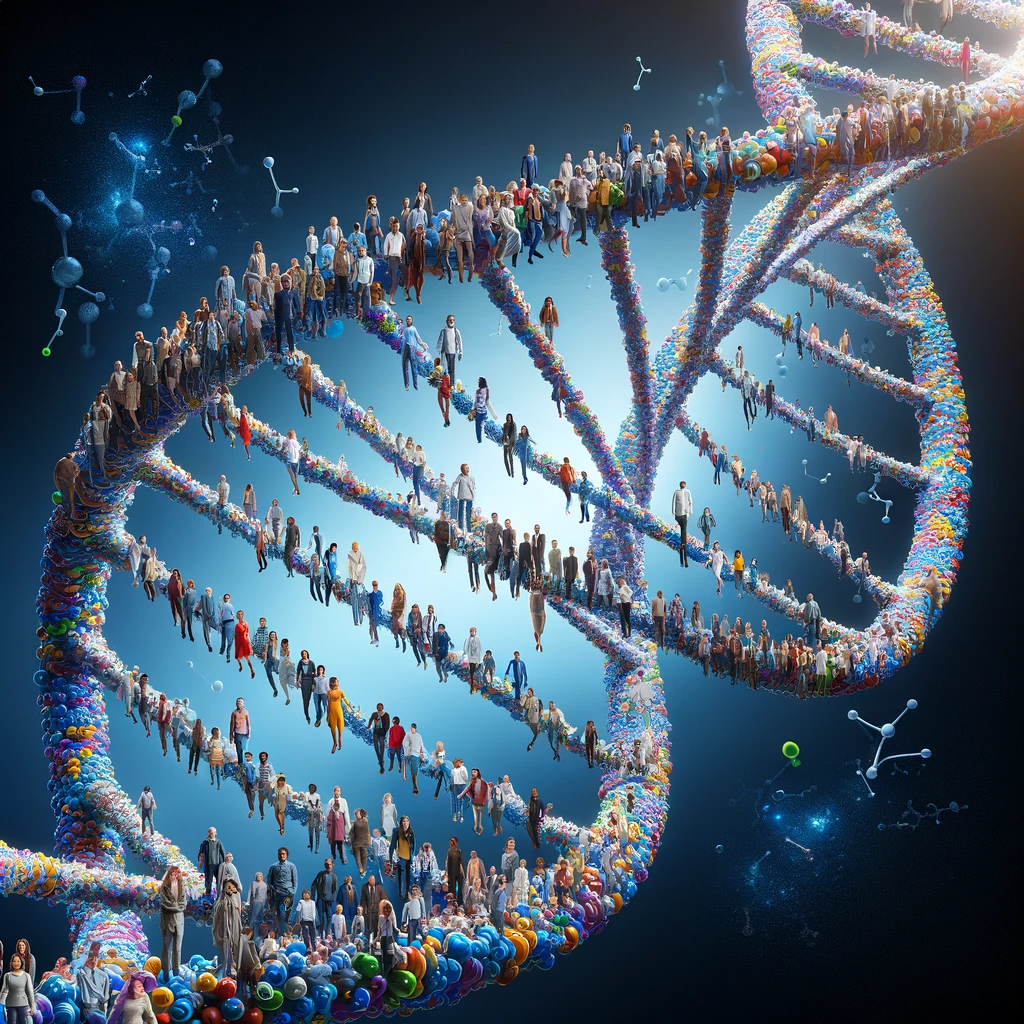Intro
Are you curious about your family history? Do you want to learn more about your roots and where you come from? If so, then you may be interested in starting your own family tree and delving into the world of genealogy. While it may seem overwhelming at first, with the abundance of information available online and in various documents, it is possible for anyone to uncover their family’s history. In this blog post, we will share some tips on how to find family and get started on your genealogy journey.
Embarking on Your Family Research Journey
Delving into your family history begins right at your doorstep. Scribble down all the knowledge you have about your kin. Gather those names, the special dates signifying birth, marriage, and passing away, and any places that hold a familial connection. Your immediate family forms the stepping stones of your ancestral expedition.
The whispers of your family history are etched in documents that have been passed down generations. Birth and marriage certificates, newspaper obituaries, and even faded photographs are more than mere pieces of paper. They’re windows into the past, key components to constructing your family tree.
Don’t underestimate the stories these documents hold. The scrawled handwriting on a birth certificate, the heartfelt words of an obituary, or the smiling faces in an old family portrait are clues waiting to be discovered. Each one is a stepping stone on the path of your genealogy journey, leading you closer to the roots of your family tree.
The Power of Home Research

Before you plunge into the endless depths of online databases, let’s not forget the historical gems that may be tucked away in the corners of your own home. Your attic or storage room can often transform into a veritable gold mine of ancestry information. Dusty letters, journals filled with scribbled notes of the past, albums brimming with sepia-toned photos, or heirlooms passed down through generations—each of these is a small treasure chest of your family’s history.
These items are fragments of your family’s past, and they can tell tales that you won’t find anywhere else. They are the intimate, personal narratives of your ancestors, interwoven with emotions and experiences. They can bring a sense of connection that is impossible to achieve through mere facts and dates.
Equally important are the living memories within your family. Engage with the older members of your family; their minds are libraries filled with stories and memories, waiting to be discovered. Ask them about their childhood, their parents, their experiences. Their vivid recollections can breathe life into your family tree, adding color and context to the names and dates you’ve gathered.
So, before turning to the world wide web, take a moment to explore your home and the people around you. You might be amazed at the wealth of knowledge right there under your roof!
Exploring Online Genealogy Databases
The digital age has made family search an adventure at the tip of your fingers. Imagine, with a few clicks and keystrokes, you can journey back in time and across continents, unlocking the secrets of your lineage. Online genealogy databases such as Ancestry and MyHeritage are the portals to this adventure. These vast virtual libraries, brimming with billions of searchable records, span across the globe. They offer a wealth of information, from birth and death records to marriage certificates and census data, painting a vivid tapestry of your ancestral history.
Don’t limit your online exploration to these popular websites, though. The digital realm also offers community databases and government records – untapped wells of information that could give you the crucial details to fill in the blanks on your family tree. A maiden name forgotten in time or an ancestral village obscured by the mist of ages may resurface here.
While navigating these digital archives, be mindful of the accuracy and reliability of the information you come across. Make sure to cross-reference and verify data, ensuring that every detail you add to your family tree is rooted in truth. Remember, your family’s past isn’t a story to be hastily read, but a mystery to be carefully unraveled. So, brace yourself for the thrill of the hunt as you delve into the vast world of online genealogy databases.
Visiting Public Libraries and Archives to Discover Family History

Don’t overlook the hallowed halls of public libraries and national archives in your quest for genealogical discovery. These venues are packed to the brim with historical records and artifacts that could provide invaluable insights into your family’s history. The whispered conversations of your ancestors are often recorded in pages kept in these timeless repositories. You might find nuggets of information about your family in census documents, military enlistment papers, immigration records, and even in the fine print of old land deeds.
The seasoned librarians and archivists in these spaces can serve as your guiding light through the maze of old documents and records. These knowledgeable professionals are adept at navigating complex filing systems and can often unearth pertinent information that you might overlook. They can provide you with valuable advice on how to extract and interpret data from the records, helping to bring your ancestral past into sharper focus.
But don’t stop at just borrowing books or scanning through archives. Libraries often provide access to online databases that can boost your research. These resources can catapult your family history search beyond geographical boundaries, allowing you to uncover hidden stories and unknown relatives.
And finally, the serenity of these spaces can be a sanctuary for you in your genealogical journey. There’s something to be said about holding a tangible piece of history in your hands – the rustle of old paper, the faded ink, the delicate handwriting. Each sensory experience is a link to the past, a tangible connection to your ancestors that adds depth to your understanding of your lineage.
So, pull open those heavy library doors, and step into a world rich with your family’s stories waiting to be discovered.
Utilizing the Power of DNA Testing

In the thrilling quest to uncover your ancestry, don’t forget to harness the cutting-edge power of science. Through DNA testing, you can unravel the enigma of your genetic ancestry, tracing your lineage back to specific regions and ethnic groups. Modern DNA testing services, like AncestryDNA and 23andMe, act as a powerful microscope that can analyze your genetic code. What these services offer goes beyond your lineage – they may even point out distant relatives who share parts of your DNA!
Imagine discovering that you have ancestral ties to the Scottish Highlands or the vast Savannahs of Africa! Or finding a long-lost third cousin living just a few states away. It’s like opening a door to a room filled with unexpected surprises and fascinating stories. And the best part? All it takes is a simple and non-invasive saliva sample you can collect in the comfort of your own home.
However, while diving into your genetic makeup, keep in mind that DNA testing should complement your genealogical research and not replace it. DNA results can suggest potential family connections, but it’s your dedicated research that will bring those connections to life. After all, your ancestors are more than just genetic codes. They’re people with rich histories, life stories, and experiences.
Therefore, let DNA testing be your ally in your genealogical journey, revealing the science behind your ancestry while you dig into the fascinating narratives that weave together to form your unique family history. Embrace this modern tool, and see how the power of DNA can illuminate your past, present, and future.
Learning from Genealogy Classes and Conferences
When it comes to unraveling your family’s past, don’t underestimate the power of collective wisdom. Genealogy classes and conferences are hotspots for knowledge exchange, bringing together budding genealogists and seasoned pros under one roof. They provide an opportunity to learn the tricks of the trade from experienced genealogists who have navigated the complex world of family history research. Plus, they’re a great platform to share your own findings, get constructive feedback, and even find solutions to the genealogical puzzles you’ve been trying to solve.
Not to mention, these gatherings offer a unique camaraderie. It’s an experience to be in a room full of people who share your passion for family history, who understand the thrill of uncovering a forgotten ancestor or piecing together a centuries-old mystery. You’ll find yourself amongst a community of history buffs, sharing fascinating tales of discovery and offering advice based on their personal research journey.
And let’s not forget the wealth of knowledge these classes and conferences have to offer. They might host workshops on how to best utilize online databases, lectures on understanding the nuances of historical documents, or seminars on the ethical implications of genealogy. They often cover a broad range of topics, from the fundamentals of family history research to niche areas like military records or ethnic genealogy.
So, step out of your home-library and embrace these communal learning platforms. You may come away with more than just a handful of research tips. You might just find a new perspective, a different approach, or a fresh inspiration to fuel your genealogy journey. After all, every family historian can benefit from a little extra knowledge and a lot of shared passion!
The Importance of Documenting and Organizing Your Family History

As you embark on this exciting expedition into your family’s past, you’ll find yourself gathering a treasure trove of information. This influx of data can quickly become overwhelming if not managed efficiently. This is where the art of organization steps in, transforming your genealogical pursuit from chaos to clarity. Implementing a system to catalog your findings is no less important than the research itself.
Think of it as setting up your very own historical archive – a personalized database where each piece of information holds its rightful place. You could harness the power of technology and use genealogy software or opt for a traditional approach with binders and folders. You could also employ a simple spreadsheet, color-coding entries based on their relevance or source. Whatever method you choose, ensure it suits your style and makes your research process smooth and enjoyable.
Remember, each nugget of information you discover has its own origin story – the source from where it was unearthed. It’s crucial to note these details down meticulously. They serve as the credentials of your data, testifying to its authenticity. They could be your guiding stars when you need to revisit a piece of information, verify its accuracy, or cross-reference it with a new discovery.
Organizing your findings is more than just about tidiness. It’s about creating a roadmap for your research journey. It aids in identifying patterns, spotting missing links, and drawing connections between various data points. It enables you to visualize your family tree in its entirety and understand the intricate weave of relationships and stories it holds.
In the grand quest of genealogy, let meticulous organization be your trusted companion, helping you navigate the myriad pathways of your ancestral past with ease and precision. After all, every great explorer knows the value of a well-drawn map!
Start explorring you Family History!
So, now you’re armed with a plethora of tips and resources to guide you on your genealogy journey. It’s time to start exploring! Roll up your sleeves, dig into those old family records, pore over the online databases, and engage in animated conversations with your family members. Immerse yourself in the process. Every name you decipher, every date you pinpoint, and every place you identify brings you one step closer to your ancestors and their stories. Remember, the beauty of this journey lies not only in the destination but in the voyage itself.
Like any expedition, there will be challenges. You might find conflicting information, or struggle to locate a particular record. But don’t be disheartened. The thrill of genealogy lies in these very mysteries, waiting to be solved. So, persevere and let your curiosity guide you.
Who knows, you might uncover a famous artist in your lineage, or trace your ancestry to a foreign land. Or perhaps, you’ll discover a familial connection with a historical event. The revelations could be endless, each one enriching your understanding of who you are and where you come from.
So, go ahead! Start your journey, and embrace the adventure of uncovering your family’s history. It’s an expedition like no other, a personal saga waiting to be written by you. And as you navigate this captivating voyage, remember to enjoy the thrill of the hunt, cherish the discoveries you make, and most importantly, appreciate the extraordinary tapestry of life and history that is your family. Happy exploring!
